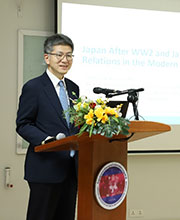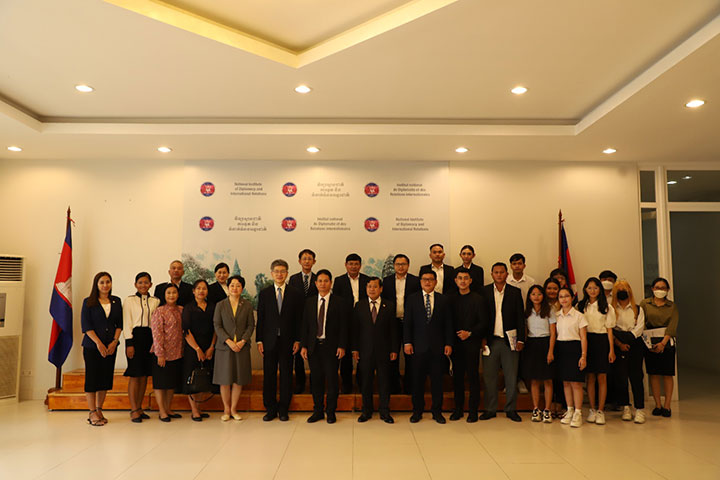Senior Research Advisor, JICA Ogata Research Institute
TAKAHARA Akio, Professor, Graduate Schools for Law and Politics,
The University of Tokyo

JICA Chair lecture in Cambodia
Since the beginning of 2022, I have delivered five lectures as the JICA Chair, a platform for conveying Japan’s experiences. These lectures, both online and offline, were held at various schools, including the Middle East Technical University in Turkey, University of Belgrade in Serbia, University of Dhaka in Bangladesh, and the National Institute of Diplomacy and International Relations in Cambodia. In addition, a co-sponsored lecture was also organized through the coordinated efforts of the University of Zambia (UNZA) and the Southern African Institute for Policy and Research. Unfortunately, I was unable to visit Turkey and Serbia in person and delivered online lectures instead. I think the number of people who listened to the lectures amounted to about 500 in total. Additionally, over 800 people have watched the lecture delivered at the University of Belgrade that was uploaded on the JICA YouTube channel.
Except for the lecture in Zambia, the lectures were all focused on the topic “Japan after World War 2 and Japan-China Relations in the Modern Era”. Today, many countries are struggling with navigating their interaction with China, especially the developing and emerging countries that are receiving large amounts of aid and investment from China. Every country, when they first started interacting with China, viewed China as the perfect partner for cooperation, without a shred of darkness in sight. Unlike with industrialized countries, China did not interfere in domestic affairs, such as stating that human rights are being violated or opposition parties are being suppressed. China would also build projects that struggled to be profitable but were necessary for the host country, and whenever summit meetings were held, China would always pledge a large amount of money as loans and investment. Even today, a large number of people in developing countries state that China is their best friend.
However, there are also many cases where their initial favorable impressions may change as they continue to interact with China. Contracted project deadlines would not be met; even when large quantities of China funds and people would enter the country, the benefit would only be extended to the Chinese people and some locals. Sometimes, the promised investments may not even be made. Ultimately, the host country is unable to repay its debts, but China won’t actively engage in discussions on debt treatment. What on earth is going on here?
A very helpful reference for deepening our understanding of China and ways of interacting with it is earned by comparing China with Japan and by looking into the experience of Japan’s interactions with China. In my lecture, I compare Japan and China on the themes of the link between domestic politics and diplomacy, nationalism and modernization, free trade and economic diplomacy, a free and open Indo-Pacific and the Belt and Road Initiative, and neighborhood diplomacy. I then explain how Japan, which once provided ardent support for the economic development of China, now has to simultaneously promote the contradictory policies of cooperation and competition. In fact, the same circumstances can be seen from the Chinese perspective as well. In other words, the reality is that not only Japan and China, but many other countries are struggling to find a balance between cooperation and competition. Many people almost sigh with relief when I say that Japan is not constantly fighting with China.
Japan is said to be an advanced country in facing new challenges, as the country has had to deal not only with pollution, financial crises, declining birth rate and an aging population, but also with an ascending China, earlier than other countries. There is a strong intellectual desire for Japan’s experience and knowledge in many countries, particularly those that have begun to face concerns regarding their interactions with China. I am happy to hear that, after my lectures, people often say that they want to know more about the perspective of the Japanese regarding China. It makes me feel that I need to work harder on dissemination. I have often experienced a good response at face-to-face question-and-answer sessions. For example, not only I received many questions from smiling students at the University of Dhaka, but even the faculty has shown interest in what I had to say. A few months after having held the JICA Chair, I was invited to give a keynote lecture at the South Asian Conference on Japanese Studies at the same university (although this was an online lecture).
As a prerequisite for effective exchange, there is a need to clear up the misunderstanding that Japan has lopsidedly developed a hardened anti-China stance and is constantly opposing China. Every country has to interact with China, so it is natural that people may think it is not worth listening to criticisms of China only. However, when people understand the reality that Japan and China also cooperate with each other, they begin to show interest and realize that Japan is in the same position as they are, possibly with similar concerns. Of course, it is also important to accurately communicate the competition aspect. Conveying a correct understanding of Japanese foreign policy to people will lead to expanding and deepening their cooperation with Japan. If even my inexpert lectures may have contributed to deepening this understanding, then it can be said that the JICA Chair certainly has significance and potential.

Commemorative photograph taken at the Cambodia JICA Chair lecture